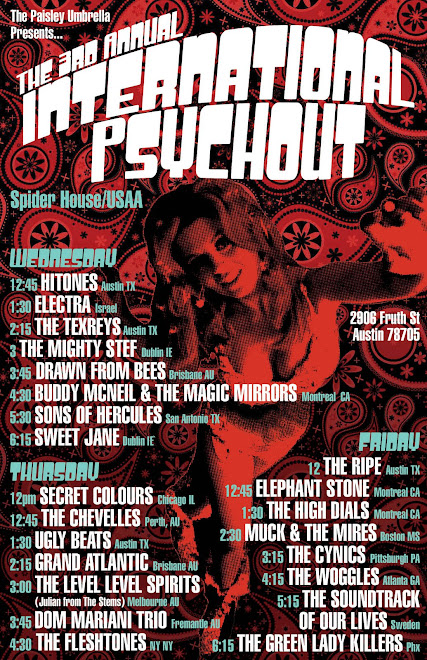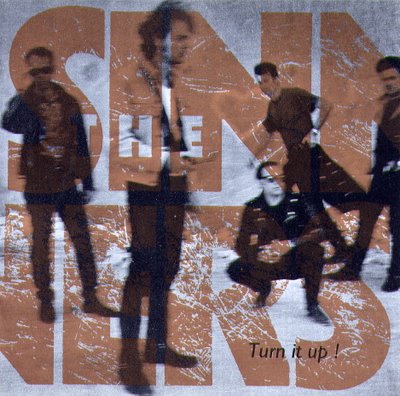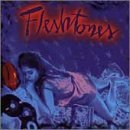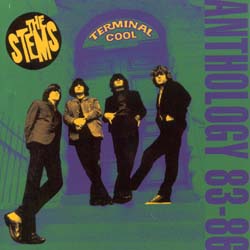SXSW 2010 approaches. It’s just like last year. A bunch of bands both old and new, a bunch of conferences with catchy titles such as “Social Networks and the Future for Musicians”, which echoes the last 6 years or so of a music industry that makes their money off of artists and are bitching, moaning, kicking, and screaming that they’re not making as much money as the used to, a bunch of parties that are also for “industry only”, which means that bands play to those who might talk about them or want to be involved with them, but nothing usually comes out of it since the same people are often attending the conference as their personal vacation and would rather see the ever growing number of well known acts admitted to SXSW. So what do you end up with? A corporate party where the current and once well known get to be seen again. Occasionally, some new act will have this great buzz and people will come to see them, but for the most part, new, unsigned, and indie label acts are overlooked. I can say this from nine years of experience now. I’ve attended plenty of SXSW showcases. The lines are around the corner for the well known acts, while the smaller acts and indie label showcases rarely reach capacity. At the same time, venues that choose not to be official SXSW participants, whether bars, independent businesses, and the like are often targeted by the fire department while the official venues are left alone at the encouragement of SXSW organizers.
How many problems can one pick out in this scenario? Too many, but this is the tip of the iceberg. The music industry, whether labels, media outlets, and others involved have been losing money and struggling with electronic media and the resulting free music and illegal pirating and sharing for a while now. As a result, new acts are less likely to get noticed and even less likely to get a good offer if someone wants them. As a result, the industry arrives at SXSW and gravitates towards the safer, larger act venues where they can chat with their own while the music’s playing. I’ve witnessed new acts in the midst of not being hard by the overwhelming chatter of the “Don’t you know who I am?” crowd countless times during the official showcases.
The private, badge and invite only day shows are much worse. I’ve attended my fair share of those, too. They’re mostly little parties that often have very promising acts, but because they’re industry only, little attention is paid to the music since they’re more of a social gathering. As great as a new act can be, there’s something fundamentally missing at shows for mostly industry people: The music fans! Face it, the “industry” is failing and forever trying to curtail how music is heard and distributed. As a result, bands are better off playing to their real audience since those people are the ones that are going to discover them, tell friends about them, buy their merchandise, follow their activities on social networks, but most of all, will find excitement and inspiration from music that affects them. Industry types are often too busy, too jaded, or simply ignore them by not paying attention during a performance or just not seeing them in favor of seeing someone well known. Whatever got many people into the music business to begin with has been long forgotten that dollar signs have greater value than the power of rock ‘n’ roll.
As an alternative to the little club that the corporate music industry is during SXSW, what would happen if these small parties were left open to the independents? The bloggers, amateur photographers, and those who still get excited about it? What would a journalist from a large print media outlet have to say if they saw a crowd of those gathered, reacting and interacting with a new act on some warm March day at a small, outdoor party? How would record label execs react if they witnessed genuine responses from those who they would actually end up profiting from? The answer is obvious, the solution even more. It’s the music fans that matter most, not the industry designed to make money off of the talents of the acts.
Honestly, what would happen if journalists, label reps, etc., were the minority at a performance with a sea of enthusiastic fans? They would have a much better idea of a band’s potential based on the crowd response as opposed to mostly industry attendance, sizing up the profitability of a band based on their sound alone. The same people would also have the opportunity to talk to the fans and find out what moves them, what they’re looking for, and most importantly, what the music means to them. It isn’t rocket science. The music biz is smart enough to know that they’re best off when they have a product that means something to people, so why not find out an act’s potential based on the response of those who would potentially buy their products? This isn’t exactly a new idea, either. Plenty of acts, including well known veterans of many different genre’s within “alternative” music do this every year. The Stems will play a free day show to a crowd a few times bigger than the one that shows up to their showcase, The Cynics will practically play anywhere and as often as they can, Michael’s voice willing, Muck & The Mires inquire about playing unofficial parties and plan on doing them well in advance, new acts get referrals and ask about doing those shows based on word from those they knew who did them before, etc. These acts could simply hang out, rest, party, and play only to industry people who can supposedly help them. Instead, they make a priority of being seen, heard as often as possible, and to meet as many as possible that are NOT part of the music business.
What happens at SXSW doesn’t stay at SXSW. The events reverberate. As much as the industry sits in their meetings, round tables, keynotes, private parties, and the like to talk about new paradigms and then get out to see popular acts that they can see more often in places like New York and L.A, it’s those that get out to play at and attend the unofficial, free gatherings that have the new paradigm. These acts meet their audience and play at unlikely places where they connect with them. They find out what their music means to those who show up to see them, they interact, try new things, sometimes have some backline related adversity and shine through it, making their performance greater. If those free shows have newer, related acts that are added to the bill that would likely not be for an official showcase, the newer acts benefit more than they would playing a private party in a tent, a regional showcase, or a small, official showcase at a club while so many people are out seeing bigger acts since they’re seen by more potential fans who are more likely to be discouraged from venturing downtown to deal with the mayhem. Quite often, those that see the bands at day shows end up choosing to go and see them again that week at an official showcase. This is the new paradigm! Bands have figured out what matters: Their fans and the independents that are going to talk about them, review their music and post their photos. These acts end up with a more dedicated following, which is something that’s very hard to come by given the fickle mindedness of popular music.
This is what SXSW used to be about: Discovering new talent. Despite good intentions, the official festival has become so popular that this objective is drowned out by the popular acts, corporate sponsorships, and exclusivity to only those who can pay more, which is really the antithesis of the rock ‘n’ roll ethos. Rock ‘N’ Roll is about rebellion, loud music, and the pure excitement of discovering something new or hearing something already known in a different light. It’s the crowd response and the connection the band makes to an audience, not the “Who’s Who” yearbook of the big players and movers, which are exactly those same people that SXSW caters to. At the same time, the organizers of SXSW in the least turn a blind eye to those that venture into playing for the fans, consider it a turf war by attempting to shut down those venues who choose not to be part of their club for the week, or at worst, turn it into a little high school game by telling acts that if they deviate by playing non official events, especially at the same time as the official showcases, that they’re not going to cut them a break by accepting them when they’re on their way downhill in the future.
I’m not claiming that SXSW and the organizers themselves are an evil entity. SXSW started out with great intentions. For better and worse, they were very, very successful. Money can change one’s objectives and there are often compromises that come to fruition as a result of greater notoriety and interest, but the result is that a large part of the soul is lost. SXSW is a huge deal. Bands from around the world come to play and get noticed by industry people, which can often help them gain a wider audience, but with the growing popularity, larger, corporate entities became involved since it was a pie that they wanted a piece of. In wanting to become a bigger event, the organizers give increasingly priority to the corporate world ever year. Unfortunately, the festival is more of a corporate schmoozefest for out of towners instead of an even where people go with the objective of hearing or seeing new things and getting challenged at the promise of rock ‘n’ roll. It’s too bad. There are so many new, indie acts out there that are making music that is better than their predecessors by ripping it off and building on top of it, which is really the way that great rock ‘n’ roll is made.
Furthermore, the music business relies on the small, independent outlets to get the word out about new acts. Social networks like myspace and others present this bombardment of music and no filter. It’s the bloggers, small print papers, and others that act as the filter by reaching out to acts, writing about them, and having a more personal forum to communicate about them. The corporate media outlets, labels, radio, and MTV and its affiliated networks have not been the tastemakers for quite some time, and even more so since there’s so much more music out there that’s readily accessible. Many people in the industry do recognize this, but one only finds out at chance meetings. SXSW has absolutely NO outlets for those that take the music seriously enough to contribute to it but don’t make a career out of it. There are no chances for sessions with larger entities that could encourage them or those that could help them gain a wider audience, which is purely needed since blogs like Pop Matters have a growing audience who reads their work and reaches a much more dedicated following.
By choice of SXSW, the budding journalists who are changing the industry don’t have access to the same tools and resources that the larger outlets take for granted, photographers have even less access to contribute by taking live shots even though many, many bands end up using photos made by fans to promote themselves. In conclusion, the very people that SXSW originally envisioned promoting and helping are excluded. New bands and those that are the most important to their success: the fans and independent bloggers, writers, photographers, and the like are shut out by choice of SXSW in favor of corporations, labels, and sponsors willing to throw enough cash into SXSW’s pockets to turn the festival into a snobby private school. If what matters the most is the music itself, they’d find ways to open the doors up a little by allowing better access to independent outlets and accept more new acts to play the official showcases. Labels, bands, and larger media outlets could communicate with their fans with contests or invites to smaller day parties where those who attend them would have a stronger emotional connection to the music and might walk away afterwards with their own rock ‘n’ roll story. Those memories are what make rock ‘n’ roll so great to everyone who loves it. It’s those memories of rare opportunities and performances, where something great happened, that make the music so important.
Unless SXSW and the industry at large can allow the influx of new ideas and new people without the same resources as the big ones by loosening the reigns a little bit on the exclusivity, the SXSW music festival is a velvet rope that allows only the popular people or those with deeper pockets in. That’s an exclusive disco. That’s not rock ‘n’ roll.





